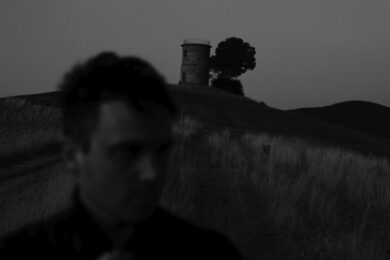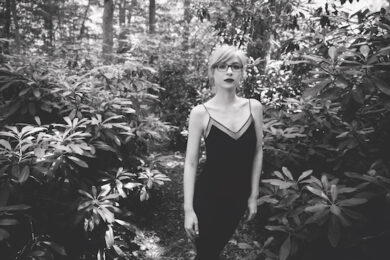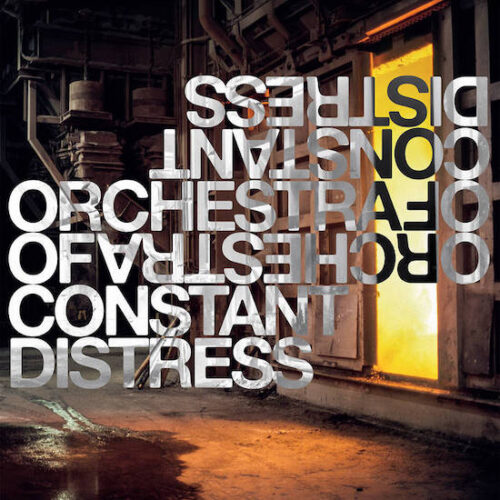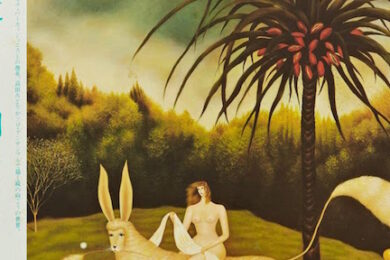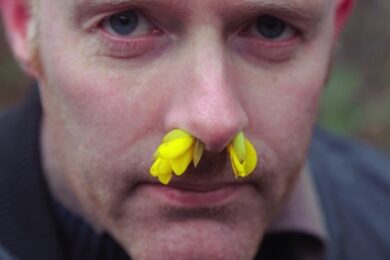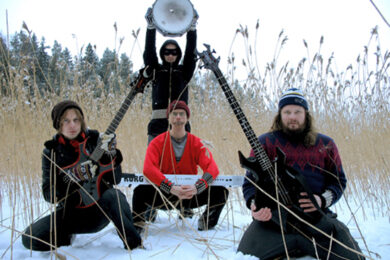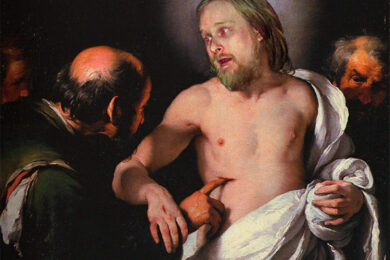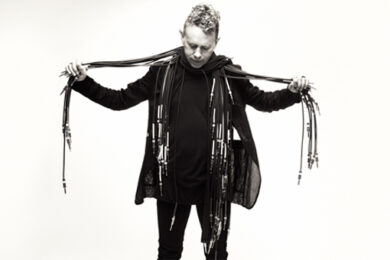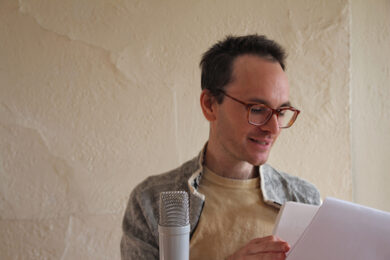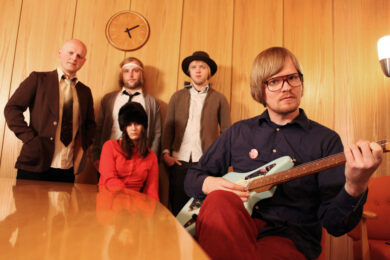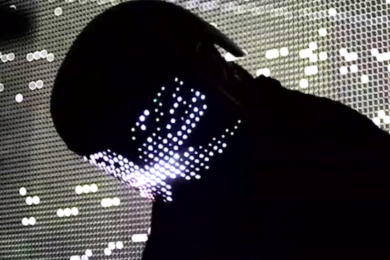Shane MacGowan is unwell. In a hotel room in London Bridge, the Pogues frontman is sat up in bed fully dressed, eating soup with his fingers. He runs them around the nearly empty bowl on the tray beside him, licks them delicately and then wipes his hand on the bed sheets. The television is on, chattering about the news, but nobody’s watching. There’s a pack of Gauloises on the bedstand and another pack of Bensons lying on the bed. Shane’s partner Victoria Mary Clarke welcomes me in. "Do you want a glass of this?" she says, proffering a bottle of red wine. "It’s very good. It costs £50."
She pours me a glass and tops up herself and Shane. He apologises for the drag of having to conduct the interview from his bed. He’s had gastroenteritis. "I’ve been ill. Nothing to do with the food. I just overdid it. The food was great. The whole thing was great. Too great. Now I’m paying the price."
So now he’s laid up in his sick bed like Cúchulainn, the mythical Irish warrior who, when his enemies finally came for him, was said to have tied himself to a standing stone so as to be able to die on his feet. When Shane wrote his song ‘The Sick Bed Of Cúchulainn’, he transposed one of the stories of the indefatigable hero onto a tale about a fighter with Frank Ryan’s anti-fascist Irish nationalists. The opening track of The Pogues’ flawless 1985 album Rum, Sodomy & The Lash, it’s archetypal MacGowan songwriting: an exuberant celebration of boozing delivered with a punk snarl yet somehow timeless, as if the song had been passed down through the ages.
But it hadn’t. Shane had to write it. In his memoir of his life in The Pogues, Here Comes Everybody, accordion player James Fearnley says of another track from that album, ‘Sally MacLennane’: "the melodies were so seamlessly Irish I was surprised to find out that the song wasn’t traditional."
Shane shrugs when I tell him this. "Well, there are similar Irish and Scottish folk songs. There’s only eight notes, or sixteen if you want to count it the proper way. I like story songs. Most really good songs, I’m not necessarily saying mine, but if you think of rock & roll, or blues, go as far back as you want, they all have a story. They’re all about a revolution, or a battle, or a love affair, or whatever. I came from a really musical family. Everybody played music and told stories and made up songs. All the neighbours did as well."
Shane MacGowan was born to an Irish family living in Kent on Christmas Day 1957. Lord knows what people listened to at Christmas before he wrote ‘Fairytale Of New York’, but presumably there was music of some description. When he was a young child his family moved back to Tipperary, but they were in England again by the time he went to school. He won a literature scholarship to go to Westminster School, but was expelled after being caught in possession of dope, acid and pills.
As a young man in London he was in a succession of "Irish ballad groups and rock bands", and felt the first trembles of punk: "Things were building up to punk for years. There were people like the Stooges, the MC5 and the Dolls. The Pistols have to take the credit, but one of the regular support gigs they got when they were starting out was with the 101ers. Joe Strummer really liked them. At that point Mick Jones and Tony James were in a band called London SS. There’s a joke behind that, because Mick had got a university degree while living up on the 90th floor of a godforsaken tower block in Harrow Road. With that degree he’d got the job of opening letter bombs for the Department of Health and Social Security: the DSS."
Shane lets out a wheezing snicker, which sounds something like how Muttley would laugh if he’d given Dick Dastardly the slip and gone out for a night on the tiles with Tom Waits instead.
"They were also into the leather and coy Fascist bling and coy Communist bling, all at the same time. I saw a guy wearing this homemade shirt one night and then the next day they had a copy of it in Sex for fucking £50. It had Marx and some Nazi or Ivan The Terrible on it, and it was covered in hammers and sickles and swastikas. It was great. The main thing was making your own stuff, which the hippies did to a certain extent with tie-dye and all that shit. You could make your own fashion, you know what I mean? Then, so that people wouldn’t feel left out if they couldn’t make their own clothes, or destroy their own clothes and then put them back together with safety pins, you could buy one for £50 from the Sex shop – or you could nick one! I used to let people nick my shirts, as advertising."
It must have been an exhilarating time to be a part of the music scene in London?
"The scene that formed round the Pistols was something that record labels just couldn’t understand at all. They were all people like Dave Dee of Dave Dee, Dozy, Beaky, Mick and Tich. Do you know them?"
I have to confess to not being au fait with the oeuvre of Dave Dee, Dozy, Beaky, Mick and Tich.
"They were a completely over-the-top, grotesque, outrageous Sixties band. In the Sixties everyone knew ‘The Legend Of Xanadu’ by Dave Dee, Dozy, Beaky, Mick and Tich. He used to crack a whip. The fact that people in those days in the state they were in could actually say their name… Dave Dee was the guy who later got sacked from one of the record labels for not signing up The Sex Pistols. Yes, they were crass and outrageous. Yes, The Sex Pistols pissed older people off, but so did Dave Dee, Dozy, Beaky, Mick and Tich!"
Shane snickers again and streaks another soupy hand down the bed sheets. Victoria, who has been watching him do this since I arrived, finally snaps: "Shane, there is a napkin!"
He glances around guiltily and wipes his hand on a napkin from the tray, then deposits it into his soup bowl.
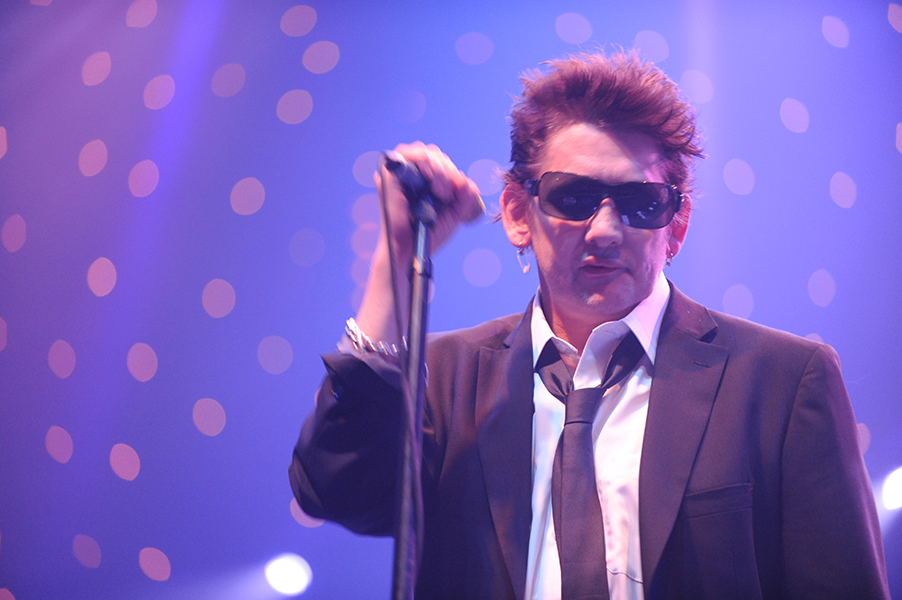
The Pogues released their first record ‘Red Roses For Me’ in 1984, a mix of Shane’s gutter hymns and traditional Irish songs with one, ‘The Auld Triangle’, written by Dominic and Brendan Behan. Behan also features on one of the album’s most famous tracks, ‘Streams Of Whiskey’, appearing to Shane in a dream. How important was the great poet’s influence on him as a young writer?
"It’s interesting. Behan recorded loads of talk-books in which he bursts into song. I think they’re great. I also think he was a great writer of stories. He used to experience things when he was pissed but he couldn’t discipline himself to write it down or type it out. Even if he had his things in the pub with him, he’d only have a pint of stout because he’d drink slowly while he was doing it. He couldn’t get wrecked and then go home and write a bloody story. It’s not the same with me. It’s strange… Later on, he could write stories when he was pissed because people recorded him. He’d go off in all directions. It’s fascinating, really fascinating."
The streams of whiskey helped the streams of consciousness along?
"Yeah, and bursting into song. All that. That’s the thing about Irish writing. It developed from story-telling. Story-telling is a huge thing in Ireland, or used to be. All the playwrights, all the novelists, all the poets… well they’re all poets. It’s all poetry, really, the same way that Shakespeare is poetry in play-form."
There’s a strong tradition of public performance.
"Yes, exactly yes. Music and poetry are meant to be performed. I mean you can get a really good poem, but if somebody reads it out without really thinking about what it means then it’s a total waste of everybody’s time."
Does he still enjoy getting up in front of an audience?
"I’m phasing it down," he says, then nods at Victoria: "She’s seen thousands of Pogues, Popes, whatever you want to call it, gigs with me in them. She reckons the first of the nights in Paris that we were filming for the DVD was really great and the second night was even better."
"I was really surprised," she says. "You never know what to expect. It might have been terrible. Ha!"
"When the Parisians go nuts they really go nuts. The audience gives you so much." He grins at Victoria: "But I’m always great, anyway."
Victoria smiles back: "You’re not always great. Sometimes you’re shit."
"Not any more!" He snickers. "Occasionally… no, I’m never shit! Sometimes I’m as boring as the rest of them, but in Paris they were great as well. The audience was great. We were great."
The Pogues’ Christmas tours have become a semi-regular fixture, and I don’t doubt that the royalty cheques for ‘Fairytale Of New York’ are a pleasant gift each year, but I ask whether Shane ever fears that song overshadows the rest of the band’s work?
He shrugs. He doesn’t seem to mind if it does or not. "Well, yes, it was a Christmas hit and Kirsty is on it and it was a special moment. It took two years for that thing to go from the original bet with Elvis Costello, who was no longer producing it when we eventually did it with Kirsty. Originally it was going to be Cait O’Riordan doing it. Cait did it well, but I think Kirsty was a really important element. She had the right attitude, and she produced herself. She separately double-tracked her own voice."
How was working with Elvis Costello on Rum, Sodomy & The Lash? Shane pauses and there’s an audible intake of breath from Victoria before he answers: "I preferred working with Kirsty!" His laugh sounds like a death rattle. "A lot! And I preferred working with Cait but he [Costello] went off and fucking married her and made her leave the bloody band. I was furious."
Shane’s own departure from the band, precipitated by his failure to even turn up for the opening dates of their 1988 American tour, finally came when he found himself sacked at a Japanese festival in 1991.
He would go on to marshall a new band, The Popes, for a few years, but before that he recorded and released a duet with Nick Cave, ‘What A Wonderful World’, in 1992. He’s recorded with Cave on several occasions since. How did that friendship come about?
"I was always into Nick Cave, and I always hoped he was into me. It turned out he was. There’s a lot of similarities, I think, between our songs. We’re very different people. We have a lot of similarities, but he’s more studious I suppose."
Victoria picks up on Shane’s understatement: "It’s strange because Nick is very intolerant of people. He really doesn’t like people. Shane is the only person I’ve ever seen him tolerate. The thing about Shane is he’s late for everything. He’s messy, he spills drinks. He’s quite the opposite of Nick, but Nick doesn’t mind. It’s strange, because he’d criticise anyone else for that. He just forgives Shane anything. Nick’s very disciplined. He gets up at 6am and sits in his little shed and writes. He loves to work more than anything."
Shane laughs: "And I love to work less than anything."
This seems to be one of the central facts of Shane’s mythology: that unlike Cave’s meticulous and painstaking craft, there was a time when Shane would simply load up on drink and drugs and the poetry would flow out of him. Was that really how he experienced it? Was the writing automatic?
"Yeah, a lot of the time, yeah. Lots of people do that. You chug away at the same old riff until it’s hypnotic. Maybe you get it wrong, and then you have a new riff, or at least a different riff. You get a title. A title is a really good start. Then musically a riff. I don’t feel like it’s me writing it."
I don’t know if he’s being disingenuous. His songwriting is rich with classical and literary allusions and layers of meaning. Was there really no graft involved in constructing them?
Shane pulls a face at this: "Well that’s not graft, do you know what I mean? Literature is just stories. One of the greatest works of literature is Finnegans Wake by James Joyce. The inspiration for that came from ‘Finnegan’s Wake’ which is a great story-song. Nobody knows who wrote it, it’s so old. Well, it’s not that old. It’s 200 years old maybe. People just used to pass it down, as often happened at wakes. That’s what wakes are for. People would start off being very nice about the person, then there’d be more and more slanging and then they’d have a huge row and all the rest of it. If that didn’t wake them up then they must be dead, yeah? It was all because there were so many premature burials in those days."
He goes to take another swig of wine, then pauses with his glass poised at his lips as he remembers something more about Joyce: "In his later years Joyce was nearly blind and he was using a typewriter that he was constantly having to hock and get out again. There were two or three bum letters on it so he didn’t know exactly what was going to come out. He had bad eyesight, a bad back, all the rest of it. In those days a doctor would write you a prescription for everything, and he was a boozer from an early age."
Were Behan and Joyce your biggest influences?
"The whole folk tradition, it doesn’t have to be Irish. I might be in a cab with a Greek guy, it might be in Greece, it might be in London, and if he’s singing this great song, great tune, beautiful song and I’m asking him: ‘Can you give me a rough idea of what it’s about?’ He’ll say: ‘It’s about a guy murdering his girlfriend.’ In Irish and English songs there’s often no reason given why the guy kills his girlfriend, then the girlfriend’s ghost warns him that he’s going to get caught. They’re going to find her body and he’s going to get hung. She’s not angry with him, because she loves him and just wants to warn him."
I guess that’s a recurring theme in folk songs.
"It’s a recurring theme in life, really." He lets out a long laugh: "Sex, birds, life, death, sex, birds, life, death."
There’s plenty of death in Shane’s writing. When he first played the band ‘A Pair Of Brown Eyes’, guitarist Spider Stacy’s initial response was: "You sick fuck! Labelled parts one to three? What sort of a twisted, fucked-up sort of mind comes up with lyrics like that?"
"Mine," said Shane.
"That song’s about a guy who’s pissed off because he’s broken up with his girlfriend," Shane explains now. "There’s also this older guy whinging away in the corner. There’s people singing songs and it gives you the titles of them. There’s a bit where Johnny Cash sings ‘A Thing Called Love’ on the jukebox, and ‘My Elusive Dreams’ is by Ray Lynam and Philomena Begley. That particular song is kind of autobiographical. It’s set in The Scottish Stores which is an Irish bar near Camden, do you know it?"
It’s now The Flying Scotsman, the rundown strip pub with blacked-out windows by King’s Cross Station.
"There’ll always be someone, you’d be sitting there feeling miserable and some old geezer says: ‘Why do you look so bloody miserable? Listen to what happened to me!’ and he tells him about whatever war it was. Of course, there was a war going on at the time in Ireland, as usual."
Having had his premature death predicated for years, Shane has now reached the 30th anniversary of The Pogues. What is he proudest of?
"Getting this far without fucking being… well, I have been in the nuthouse. I’ve been locked up a few times, but without any serious… I have been beaten up several times. Then I’ve beaten other people up. I’ve had some ludicrous accidents, but…"
He looks at Victoria. "You’re alive," she says.
Shane seizes on this: "Yes! That’s my greatest achievement: still being alive!"
"You’ve come very, very close to death," she replies. "I found you not breathing once."
"A couple of times you’ve started my heart."
Victoria turns to me: "He jumped out of a moving car onto a motorway."
Shane reacts with practised exasperation. He’s fought this corner before: "The woman was only driving at twenty miles an hour and she couldn’t see! She wasn’t wearing her glasses!"
Victoria ignores his protestations: "And he got hit by a taxi that was going quite fast."
Shane nods: "Twice. Once I got hit by a taxi that was going pretty fast, but it glanced off me. If it had been a few inches in the other direction he’d have hit me head on and I’d be dead. I was knocked 18 feet across the road. On another occasion it happened when I was working at the Hudson Bay Warehouse. I wasn’t even drunk, just hungover from the night before. I was doing overtime on a Sunday. At lunch hour most people used to go across the road to the pub. I was just wandering across, and this Renault hit me much faster than the taxi. Again he glanced me but it knocked me across the road. I was really lucky. I didn’t even realise I had a lacerated arm. With the taxi I had a smashed up leg on one side."
Shane ruminates on this for a moment. "You know, some people are lucky, and some people aren’t. I’m a lucky guy, as a general rule."
Do you have any regrets?
"There are things that I wish had gone the other way, but there are no regrets. I savagely get rid of them. I won’t dwell on regrets. If it means going out and having a skin full then I’ll go out and have a skin full."
He pauses and grins: "Then I’ll have something else to regret."
Everyone laughs, and Shane turns the conversation back to writing. He asks about my work, then tells me proudly about Victoria’s books, which she believes are channeled from angels. I ask him if he’s religious?
"If you mean by ‘religious’, do I believe that things have happened to me which aren’t supposed to be possible? Then yes. I’m not going to say that I didn’t see what I’ve seen. I’ve seen ghosts. I’ve seen loads of ghosts. Whether it was Ireland or England I was always brought up in fairly haunted areas, particularly in Ireland. Well, the whole of Ireland is haunted."
"I don’t see things," Victoria points out.
"But you hear them."
"I don’t hear them," she says, "but the words come automatically."
"I actually see people dictating to me behind me through… they call it the third eye, but the Japs reckon you’ve got at least eight, apart from the two here. I’ve seen ghosts behind me in period costume dictating songs on a couple of occasions. ‘A Rainy Night In Soho’ was automatic writing. I had no idea what it was about. I had a vague idea by the time I got to the fourth verse but until then I hadn’t got a clue what was going on."
I’m not sure that I believe in angels or ghosts in period costumes, but I do believe that anything that helps a person write a song as fierce and pure and righteous as ‘A Rainy Night In Soho’ is a good thing. I tell Shane that the line that always floors me is when he starts the final verse with: "Now the song is nearly over…"
"That just came out, you know what I mean? I know it sounds very clever-clever, but it wasn’t me being clever-clever."
It seems self-aware, but it really captures that feeling of melancholy.
"Yes, yes. It’s meant to be melancholy. It is melancholy."
It’s hard to imagine writing something that beautiful while being completely out of it, I say, but maybe that’s your gift.
Shane takes another swig of wine. His eyes twinkle with a wild kind of joy: "I do have a gift for getting out of it."
The Pogues’ Live At The Olympia – Best Of CD and DVD is out now


